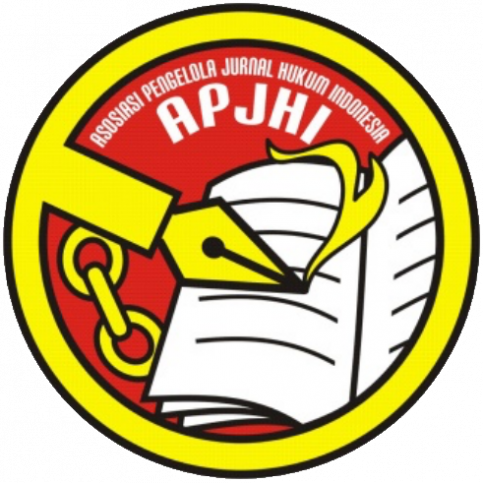PROS AND CONS LAW OF CREATION BASED ON LEGAL SOCIOLOGY ANALYSIS
Abstract
Full Text:
PDFReferences
Adi, R. (2012). Sosiologi hukum: Kajian hukum secara sosiologis. Yayasan Pustaka Obor Indonesia.
Asshiddiqie, J. (2010). Perihal undang-undang. Rajawali Pers.
Asshiddiqie, J. (2011). Gagasan negara hukum Indonesia. Makalah Disampaikan Dalam Forum
Dialog Perencanaan Pembangunan Hukum Nasional Yang Diselenggarakan Oleh Badan
Pembinaan Hukum Nasional Kementerian Hukum Dan.
Cahyadi, A., & Danardono, D. (2009). Sosiologi Hukum dalam Perubahan. Yayasan Pustaka Obor
Indonesia.
Darmawan, A. (2020). POLITIK HUKUM OMNIBUS LAW DALAM KONTEKS
PEMBANGUNAN EKONOMI INDONESIA. Indonesian Journal of Law and Policy
Studies, 1(1), 13–24.
Kurniawan, F. (2020). Problematika Pembentukan RUU Cipta Kerja Dengan Konsep Omnibus
Law. Jurnal Panorama Hukum, 5(1), 63–76.
Marzuki, M. (2017). Penelitian Hukum: Edisi Revisi. Prenada Media.
Otje Salman, H. R., & Susanto, A. F. (2012). Beberapa Aspek Sosiologi Hukum. Bandung:
Alumni.
Pitriyantini, P. E. (2020). MEWUJUDKAN KEPASTIAN MELAUI RANCANGAN
UNDANG-UNDANG OMNIBUS LAW BAGI KESEJAHTERAAN MASYARAKAT
INDONESIA. Majalah Ilmiah Universitas Tabanan, 17(1), 58–62.
Prakoso, A. (2009). ANALISIS PERKEMBANGAN TINGKAT KESEHATAN
PERUSAHAAN DENGAN RASIO KEUANGAN PADA INDUSTRI CEMENT YANG
TERDAFTAR DI BURSA EFEK INDONESIA [PhD Thesis]. Universitas
Muhammadiyah Surakarta.
Putra, A. (2020). PENERAPAN OMNIBUS LAW DALAM UPAYA REFORMASI
REGULASI. Jurnal Legislasi Indonesia, 17(1), 1–10.
Soekanto, S., & Abdullah, M. (1980). Sosiologi hukum dalam masyarakat. Rajawali.
Suadi, H. A. (2018). Sosiologi Hukum: Penegakan, Realitas dan Nilai Moralitas Hukum (Edisi
Pertama). Prenada Media.
Suriadinata, V. (2019). Penyusunan Undang-Undang Di Bidang Investasi: Kajian Pembentukan
Omnibus Law Di Indonesia. Refleksi Hukum: Jurnal Ilmu Hukum, 4(1), 115–132.
DOI: http://dx.doi.org/10.31000/jhr.v8i2.3583
Article Metrics
Abstract - 692 PDF - 421Refbacks
- There are currently no refbacks.

This work is licensed under a Creative Commons Attribution-ShareAlike 4.0 International License.

